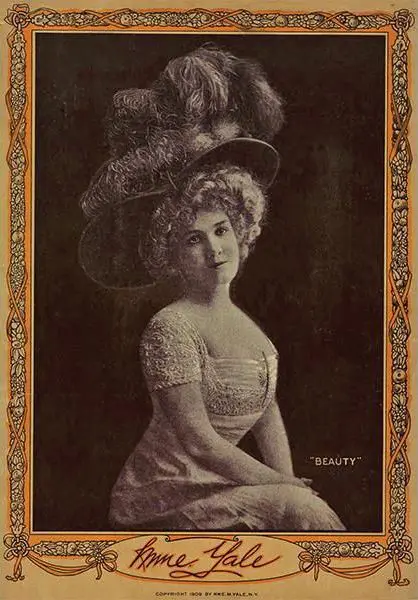One April afternoon in 1897, thousands of women gathered at the Boston Theater to see the most captivating lady entrepreneur in the United States, a 45-year-old former housewife whose personal branding talent could rival that of any celebrity on Instagram today. . Her name is Madame Yale. For several hours and numerous dress changes, she preached her “Religion of Beauty”, telling the audience about the most beautiful women in history – a group that includes Helen of Troy, the Roman goddess Diana and apparently Madame Yale herself.
This event is her 11th public appearance in Boston in recent years, and in addition to words about beauty, it also includes various lotions and decoctions – products that Yale, of course, sells – which she says have turned her from a fat and exhausted woman in the beauty of the stage. And indeed: her tall, hourglass-shaped figure is dressed in white silk, and her blond curls fall around her heart-shaped pink-cheeked face. The applause is thundering. The Boston Herald praises her “proposal for health and beauty” in a country where “every woman wants to be good and look good.”
Madame Yale has been making similar public presentations about beauty throughout the country since 1892, presenting herself in a way very familiar to consumers today. She is a true pioneer in what business gurus call wellness – which costs about $ 4.5 trillion worldwide today – and this achievement alone is enough to draw her attention.
Day after day, online, in the press, on television and on social media, women are flooded with ads for wellness products that promise to fix the skin and digestion, hair and mood seemingly at once. Madame Yale, born Maude Mayberg in 1852, used the same techniques more than a century ago. In fact, she is the spiritual godmother of Gwyneth Paltrow, who founded the $ 250 million Goop Corporation.
Like other gurus, Madame Yale is an attractive blonde woman – “as beautiful as a woman can be,” says New Orleans Picayune and “the most beautiful woman known on Earth since Helen of Troy,” according to the Buffalo Times. Madame Yale became famous during a boom for women entrepreneurs in the field of beauty, shortly before Elizabeth Arden and Estee Lauder, whose makeup empires are still alive today. But Madame Yale differs from these tycoons by promising to transform women from the inside out, instead of helping them hide their imperfections on the façade. This in itself is a genius trick: Since wearing visible makeup remains a questionable moral choice during this period, many women flock to Yale’s product offerings in hopes of becoming so naturally flawless that they don’t need to paint their faces. In the 1990s, her business was valued at $ 500,000 – about $ 15 million in today’s money.
In the archives of the New Orleans Pharmacy Museum, among yellowed ads for cocaine-soaked toothache drops and opium-soaked tampons, we find a worn-out promotional brochure about Yale’s core business, Fruitcura, the product she advertises most widely. . Madame Yale says she came across the elixir during a dark period in her life – when “my cheeks were sunken, my eyes were hollow and expressionless, and my complexion looked hopelessly pale. Her clients make “sincere and casual” comments in the brochures. One woman wrote that “I suffered from women’s troubles for more than 10 years, was in the hospital and was treated by some of the best doctors, but I did not receive constant relief until I started taking your medication.”
In the late 19th century, medical experts – almost exclusively men – were largely helpless in what could only be described as an epidemic of acute malaise among women, according to Complaints and Disorders: Sexual Policy in Sickness, a story published by Barbara Ehrenreich and Deirdre English in 1973.
Especially wealthy women complain of endless malaise, seizures and inability to eat, loss of femininity with advancing age, marriage and childbirth. In response, doctors often attribute their physical complaints to psychological illnesses and say that too much activity in a woman’s mind can lead to uterine dysfunction. They are prescribed endless bed rest.







